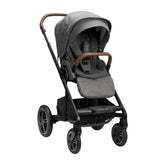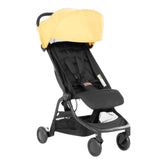Recovering from a Difficult Birth Experience

For many women, giving birth is generally a positive event that they remember with tenderness. However, for others, childbirth can be a challenging, painful, and scary experience that leaves psychological and emotional scars as well as physical. Research estimates approximately one in three women experiences birth trauma, resulting in long-term psychological and physical consequences. Birth trauma may also trigger postpartum anxiety, challenges forming an emotional connection with the baby, and post-traumatic stress disorder (PTSD). Recovery after giving birth, especially a difficult or traumatic one, can be difficult. Fortunately, there are measures you can take to heal.
What is Birth Trauma?
Birth trauma is the result of extreme distress during labor and delivery. What qualifies as “extreme” is subjective and varies between women, but in most instances, trauma is triggered by the fear that your or your child will die. Other factors that may cause a particularly difficult birth experience include the following:
- Extended labor
- Uncommunicative caregivers
- Severe labor pain
- Extreme loss of dignity or privacy while giving birth
- Stillbirth
- Birth of an infant with a disability resulting from a traumatic birth
- Infant’s stay in the neonatal intensive care unit
- High levels of medical intervention
- Inferior postnatal care
- Prior trauma (for example, from childhood, with a prior birth, or domestic violence)
Symptoms of Birth Trauma
For someone who has just experienced a difficult birth, it’s possible to experience any of the following symptoms:
- Re-living the event over and over, via invasive memories, nightmares, or panicked flashbacks.
- Extreme alertness and worry that something awful is going to happen to themselves or their infant.
- General sadness and melancholy. Women who’ve experienced a difficult birth may blame themselves for what happened or have some memory loss.
- Avoiding people and places that call to mind the events they just experienced, such as driving past the place the baby was born or interacting with other new moms.
Physical Effects of Birth Trauma
The impact of a traumatic birth on a person’s physical recovery varies depending on what happened. Women who experience severe tears, emergency surgery, or extreme medical intervention, like the use of vacuum extraction or forceps, may have longer-lasting pain or urinary incontinence. Other women may have difficulty establishing a nursing routine or resuming sexual intimacy later on.

Psychological Effects of Birth Trauma
For many women, the psychological impact is a more difficult, longer-lasting burden to bear. Anxiety, grief, fear, and severe postpartum depression are all linked to a difficult birth experience, along with PTSD. Some studies suggest that people who have a difficult birth experience may be less inclined to have more children later on.
A traumatic birth leaves many women struggling with a sense of fear and loss: loss of control, loss of safety, and fear of something bad happening to their baby. For some, this creates a sense of hypervigilance in their parenting and feelings of disconnect with their child and partner.
Postpartum PTSD After a Difficult Birth Experience
PTSD isn’t only a war-time experience. Research shows that of those parents who’ve experienced a difficult or traumatic birth, one in four reports some component of clinically significant PTSD symptoms. These symptoms may include the following:
- Self-blame
- Panic attacks
- Anxiety attacks
- Nightmares
- Trouble bonding with the infant
- Extreme mistrust of the medical community
- Hypervigilance
- Sleep difficulties
- Invasive thoughts
- Flashbacks
- Suicidal ideation
Postpartum PTSD is massively taxing on a person, causing them to essentially re-live the experience as they are flooded with the memories and feelings tied to the event. Sufferers may feel overwhelmed with sounds, smells, or other external stimuli that remind them of the difficult birth experience. This may cause stress in their relationships and affect their ability to emotionally connect with their infant. They may experience an increase in panic or anxiety attacks or complete disconnection from activities they once enjoyed. Parents experiencing any of these symptoms should reach out to a trusted doctor for help and advice.
Recovery After a Difficult Birth
Pinpointing what elements of your childbirth experience were traumatic is the first step toward recovering from a difficult birth experience. The next step is talking it through with a medical professional who has awareness of and experience with traumatic childbirth. Your obstetrician, gynecologist, or midwife may be a good place to start and can point you in the right direction for further care.
Other resources include an organization called Improving Birth, which offers an “accountability toolkit” for filing complaints. Another organization, Postpartum Support International, provides mental health resources.
Thoughtful, caring discussion and connection with someone who can provide empathy while you grieve, process, and deal with what happened is the next step. This could be a partner, a therapist, a friend or family member, or a group of other sufferers. Then, after you’ve worked through your feelings, you can see what steps you might want to take to reorganize and rebuild as you shift that difficult birth experience from the present to the past.
The Takeaway on Recovering from a Difficult Birth Experience
Identifying precisely what aspects of your birth experience were traumatizing can be challenging, especially when everyone around you thinks you should just be happy there’s a new baby around. Yet it’s critical to remember that your emotions and feelings are reasonable and that they probably won’t simply go away without help. Getting the emotional support you need from those you trust can help build the way to true healing and recovery.









